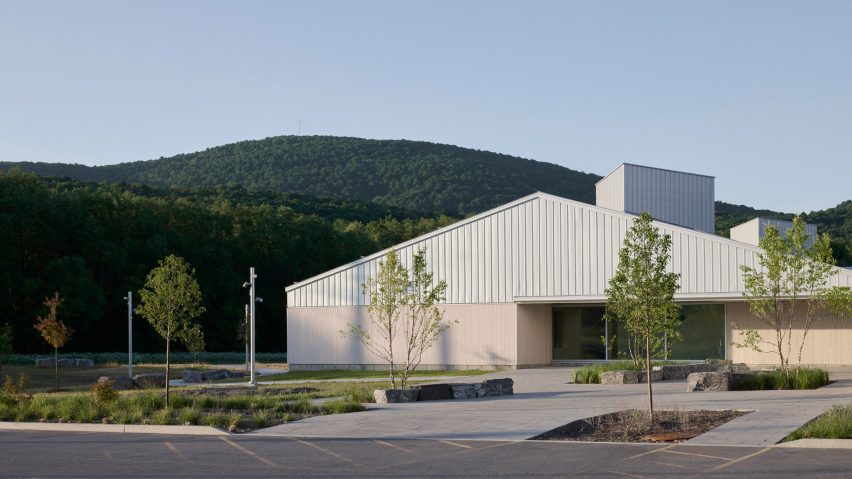Local architecture studios Pelletier de Fontenay and Leclerc Architects have created a Quebec primary school organised around an open courtyard to create a "permeable" boundary with nature.
Located outside of Montreal in Shefford, École du Zénith is composed of a chain of five one-storey volumes or "pavilions" that wrap around a central open space recess yard.
The building is the result of a 2019 architecture competition hosted by local non-profit Lab-École, which focuses on developing school models that encourage active and healthy lifestyles for students.
Pelletier de Fontenay and Leclerc Architects won the competition with their entry, a design that encourages connection to the outdoors.
Elements such as its courtyard, large windows and multiple openings are meant to lessen the boundary between the interior and exterior for students, according to the team. The school is also oriented towards views of the neighbouring Mont Shefford.
"With large windows, overhanging roofs, and multiple entry points, the architecture aims to make the boundary between inside and outside as permeable as possible, thus connecting the architecture with the landscape," said the team.
The courtyard contains a mixture of local plantings, surfaces, boulders and an edible garden, which students are encouraged to explore.
The building is defined by its low-lying roof, which features generous eaves, and triangular skylight "chimneys" that protrude from each volume and also act to expel warm, rising air through shafts.
The gabled forms are meant to offer familiarity to students, as they echo the language of surrounding countryside architecture.
"Without literally reproducing the vernacular architecture of the surrounding area, the school, with its low volumes and sloped roofs, offers archetypal forms that echo the nearby houses or farm buildings," said the team.
"Thus, children enter a world that is familiar to them; a warm and welcoming world."
The school branches out from a single volume that contains public and administrative spaces, which form the backmost perimeter of the building.
Its interior contains a set of large pale green stairs that act as a "common space" leading down towards a ribbon of floor-to-ceiling windows that lead into the courtyard. A smaller play area is contained in the mezzanine above, topped by the gabled roof and a triangular skylight.
Administrative spaces, a staff lounge area, two multi-purpose studios and other amenity spaces were tucked around the stairs.
A similar strategy was implemented into the other volumes, which contain classrooms of mixed ages organised around sets of brightly coloured stadium-style stairs.
"Shared among four classes, the collaboration zone partly unfolds in double height and partly in a mezzanine accessible by a bleacher stair," said the team.
The classrooms themselves also feature large, operable windows, which are covered by the overhanging eaves to "help control summer radiation and minimize solar gains".
Another volume contains a subterranean gymnasium, which is illuminated through ribbon windows and another large, triangular skylight.
A heavy timber ceiling is exposed throughout the project, which drove the interior palette of neutral materials and "muted" blues and greens.
"The material and colour palette is in harmony with the exposed wood," said Pelletier de Fontenay founder Hubert Pelletier. "Warm whites, off-white wood-fiber acoustic panels, light grey pinboards – it creates a warm natural background for the school, making it a soft and calming environment."
Pelletier de Fontenay is a Montreal-based architectural studio founded in 2010 by Hubert Pelletier and Yves de Fontenay and Leclerc Architects was formed in 1998, after Georges Lemay and Claude Leclerc founded Lemay-Leclerc in 1957.
Pelletier de Fontenay recently drew from vernacular farms for a residential project and also worked on an insectarium in Montreal.
The photography is by James Brittain
Project credits:
Architecture: Pelletier de Fontenay + Leclerc
Landscape architecture: Agent Relic Design
Structure: Lateral Conseil
Civil: Gravitaire
Electromechanical: BPA

